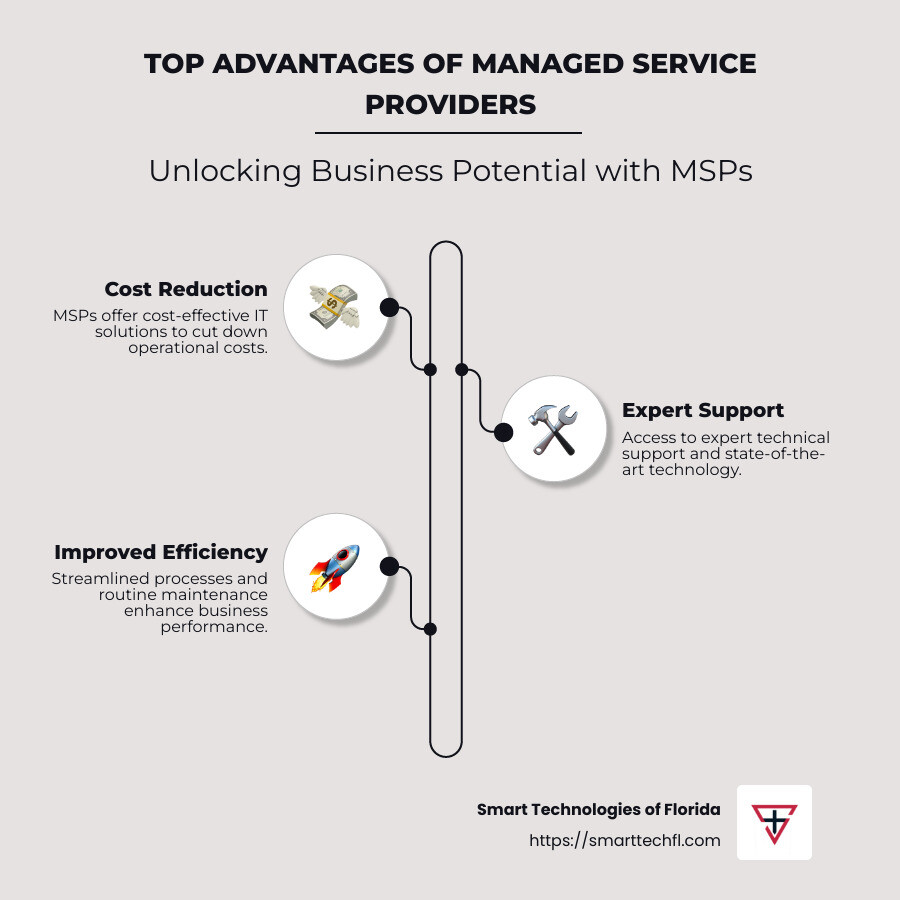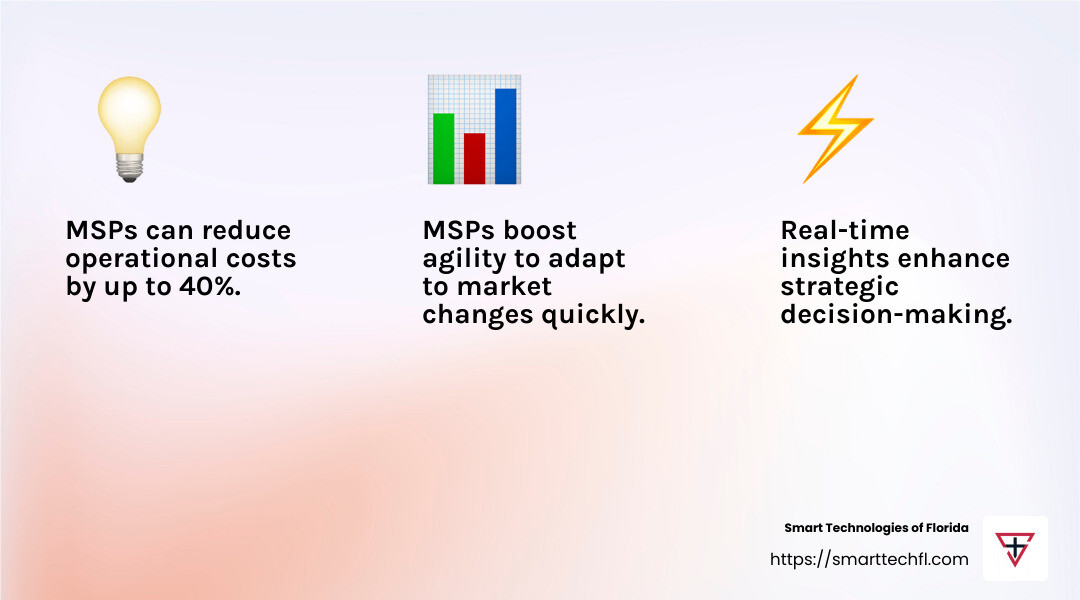Unlocking the Power of MSPs: A How-To Article
A managed service provider (MSP) can be a game-changer for businesses seeking efficiency and growth without the hassle of maintaining complex IT systems. An MSP is essentially a company that remotely manages a customer’s IT infrastructure and end-user systems, usually on a proactive basis and under a subscription model.
For those wondering what a managed service provider can do for your business:
- Cuts down operational costs by offering cost-effective IT solutions.
- Provides expert technical support and state-of-the-art technology.
- Improves business efficiency through streamlined processes and routine maintenance.
- Improves cybersecurity and compliance, protecting your data.
- Offers scalability and flexibility to grow with your business.
Embracing digital change is essential to stay competitive. Many businesses, like mid-sized retail companies, face challenges with outdated technology and high costs. MSPs provide custom solutions to help these companies streamline processes, reduce expenses, and leverage technology for growth—all while empowering their staff.
By partnering with an MSP, your business can open up new potential and drive significant change. This partnership can improve operational efficiency and improve customer engagement, setting a foundation for a thriving future.

Understanding Managed Service Providers
A managed service provider (MSP) is your go-to partner for handling IT infrastructure and end-user systems. Think of them as your tech support superheroes, swooping in to manage everything from your network to your applications.
What Exactly is an MSP?
An MSP is a company that takes care of your IT needs, often remotely. They monitor and manage your systems to ensure everything runs smoothly. This can include everything from setting up networks to managing software applications. By taking on these tasks, MSPs allow you to focus on what your business does best.
The Core of IT Infrastructure
IT infrastructure is the backbone of any business. It includes hardware, software, networks, and facilities needed for IT operations. MSPs step in to manage these components, ensuring they are reliable and up-to-date. They offer services like cloud management, cybersecurity, and data storage solutions.
For instance, a growing business might struggle with maintaining its servers and ensuring data security. An MSP can provide cloud services to store data safely and streamline operations, allowing the business to scale efficiently.
End-User Systems: The Frontline
End-user systems refer to the devices and applications employees use daily, like computers, printers, and software. MSPs manage these systems to ensure they work seamlessly. They provide technical support, perform updates, and troubleshoot issues, keeping everything running smoothly.
Imagine a retail company that relies on multiple point-of-sale systems. An MSP can ensure these systems are always operational, preventing downtime and keeping sales flowing.
Why Choose an MSP?
Partnering with an MSP offers several benefits:
- Cost Savings: Reduces the need for in-house IT staff and infrastructure.
- Expert Support: Access to a team of IT experts without hiring full-time employees.
- Scalability: Easily scale IT services up or down as your business grows.
- Security: Improved cybersecurity measures to protect your data.
By understanding and leveraging the power of MSPs, businesses can steer the complexities of IT with ease. This partnership not only optimizes operations but also positions companies for future growth.

Next, we’ll explore the key benefits of working with a managed service provider and how it can transform your business.
Key Benefits of Managed Service Providers
When you team up with a managed service provider (MSP), you’re not just outsourcing tasks—you’re open uping a set of strategic benefits that can transform your business operations.
Visibility: See Everything Clearly
One of the standout advantages of working with an MSP is improved visibility. MSPs use advanced monitoring tools to keep an eye on your entire IT infrastructure. This means you get real-time insights into your systems, allowing you to spot potential issues before they become costly problems.
Imagine being able to see your network’s health and performance at a glance. This level of transparency helps you make informed decisions and ensures your IT systems align with your business goals.
Agility: Adapt and Thrive
In today’s business world, agility is key. MSPs provide the flexibility to adapt to changing market conditions quickly. Whether you need to scale up your operations or pivot to a new strategy, an MSP can adjust your IT services to meet your needs.
For example, if your retail business experiences seasonal spikes in demand, an MSP can ramp up support and resources to ensure seamless operations during peak times.
Cost Savings: Spend Smarter
Partnering with an MSP can lead to significant cost savings. By outsourcing IT services, you reduce the need for a large in-house IT team and the associated overhead costs.
MSPs offer predictable pricing models, allowing you to budget more effectively. This means you can allocate funds to other critical areas of your business, driving growth and innovation.

Scalability: Grow Without Limits
MSPs offer scalable solutions that grow with your business. Whether you’re a startup or an established enterprise, an MSP can provide the right level of support as your needs evolve.
Consider a tech company expanding into new markets. An MSP can seamlessly integrate new offices into the existing IT framework, ensuring consistent service and support across locations.
Compliance: Stay on the Right Side of Regulations
Navigating the complex web of industry regulations can be daunting. MSPs help ensure compliance by implementing best practices and keeping your systems up-to-date with the latest standards. This reduces the risk of costly fines and protects your reputation.
For businesses in highly regulated industries, like healthcare or finance, MSPs can manage compliance requirements, giving you peace of mind and more time to focus on your core business activities.
By leveraging these key benefits, businesses can not only streamline their operations but also position themselves for long-term success. Next, we’ll dive into how to choose the right MSP for your specific needs and goals.
How to Choose the Right Managed Service Provider
Choosing the right managed service provider (MSP) is crucial for maximizing the benefits of outsourcing IT services. Here’s a simple checklist to help guide your decision:
Checklist for Selecting an MSP
- Identify Your Needs: Clearly define what services you require. Do you need technical support, network management, or cybersecurity solutions? Knowing this helps narrow down your options.
- Evaluate Experience and Expertise: Look for an MSP with a proven track record in your industry. Experience matters, especially for complex processes that require specialized knowledge.
- Check Customization Options: Ensure the MSP can tailor their services to fit your unique business needs. A one-size-fits-all approach might not be effective.
- Assess Integration Capabilities: The MSP should integrate seamlessly with your existing systems. This minimizes disruption and ensures a smooth transition.
- Review Pricing Models: Understand the pricing structure—whether it’s subscription-based or pay-as-you-go. Transparent pricing helps avoid unexpected costs.
- Examine Security Measures: With cyber threats on the rise, prioritize an MSP with robust security protocols and certifications.
- Consider Scalability: Choose an MSP that can grow with your business. Scalability ensures you won’t outgrow their services as your business expands.
- Investigate Support and Communication: Reliable, 24/7 support is essential. Regular updates and open communication foster a strong partnership.
Strategic Workforce Planning
An effective MSP does more than manage IT services; they play a key role in strategic workforce planning. By analyzing your current workforce and future needs, an MSP can help optimize your resource allocation. This ensures you have the right talent and technology in place to meet business goals.
Supplier Management
MSPs often act as intermediaries between your business and technology suppliers. They handle supplier management, ensuring you get the best deals and service quality. This not only saves time but also leverages the MSP’s expertise in negotiating and managing vendor relationships.
By following this checklist and considering strategic workforce planning and supplier management, you can choose an MSP that aligns with your business goals and drives success. Up next, we’ll explore how MSPs compare to other service models.
Managed Service Provider vs Other Service Models
When considering a managed service provider (MSP), understand how they differ from traditional IT support and in-house IT teams. Let’s break it down:
MSP vs Traditional IT Support
Traditional IT support is often reactive. You call them when something breaks. This model, known as the “break-fix” approach, can lead to unexpected costs and downtime.
In contrast, an MSP offers proactive support. They continuously monitor systems to prevent problems before they occur. This proactive model ensures less downtime and more predictable costs. MSPs also offer a broader range of services, including cybersecurity and cloud management, which are not typically covered by traditional IT support.
MSP vs In-House IT
Hiring an in-house IT team means you have dedicated staff on-site. They understand your systems and culture. However, this can be costly, especially for small businesses that might not need full-time IT staff.
An MSP provides flexibility. You get access to a team of experts without the overhead of full-time employees. This is especially beneficial for businesses that need specialized skills but cannot afford to hire experts for every IT function. Plus, MSPs can scale their services as your business grows, offering more resources when needed.
Contingent Workforce
An MSP can also manage your contingent workforce—temporary or freelance workers who fill specific needs. This is crucial in today’s economy, where businesses need to be agile and responsive to market changes.
By managing contingent workers, MSPs help businesses remain compliant with labor laws and optimize workforce management. They ensure you have the right talent at the right time, without the hassle of recruitment and administration.
In summary, MSPs offer a comprehensive, flexible, and proactive approach to IT services, contrasting sharply with traditional models. This makes them an attractive option for businesses looking to improve efficiency and agility. Next, we’ll address some frequently asked questions about MSPs to help clarify their role further.
Frequently Asked Questions about Managed Service Providers
What is an example of a MSP?
An example of a managed service provider (MSP) is a company that offers comprehensive technical support and subscription services for businesses. These services often include around-the-clock monitoring, security management, and IT infrastructure support. MSPs act as an extension of your IT department, providing expertise and resources that might not be available in-house.
For instance, an MSP might offer a subscription service where businesses pay a monthly fee for access to IT support and services. This could include managing network security, updating software, and ensuring that systems run smoothly. With this model, businesses benefit from predictable costs and reduced downtime, as the MSP proactively handles potential issues.
What does an MSP do?
A managed service provider performs a variety of functions to support businesses’ IT needs. Here are a few key roles they play:
- Network Services: MSPs manage a company’s network infrastructure, ensuring that data flows smoothly and securely. They monitor network performance, handle troubleshooting, and implement security protocols to protect against cyber threats.
- Application Management: MSPs oversee the deployment, operation, and maintenance of business applications. This includes software updates, bug fixes, and ensuring compatibility with other systems. By doing so, they help businesses maintain productivity and minimize disruptions.
Overall, MSPs provide a wide range of services that help businesses operate efficiently and securely. They take on the responsibility of managing IT systems, allowing businesses to focus on their core operations without worrying about technical issues. This strategic partnership can lead to improved efficiency, reduced costs, and improved business growth.
In the next section, we’ll explore how MSPs compare to other service models, giving you a clearer picture of their unique advantages.
Conclusion
At Smart Technologies of Florida, we understand that navigating the digital landscape can be challenging. That’s why we specialize in providing custom digital solutions custom to your unique business needs. With 23 years of experience, we have honed our approach to empower businesses through strategic change and innovation.
Our people-centric methodology ensures that we align our solutions with your specific goals, driving meaningful change. Whether you’re looking to streamline operations, improve security, or scale your IT infrastructure, our team is equipped to support your journey.
By partnering with us, you gain access to a wealth of expertise and cutting-edge technologies. We work closely with you to identify opportunities for growth and efficiency, making sure that every step of the change process is seamless and impactful.
Choosing the right managed service provider is crucial for any business aiming to thrive in today’s environment. At Smart Technologies of Florida, we are committed to being that partner for you. Our goal is to help you open up the full potential of MSPs, enabling you to focus on what truly matters—your core business operations.
Ready to explore how our managed services can benefit your organization? Find more about our offerings here. Let us help you transform your business for the digital age.
Empower your business with Smart Technologies of Florida and experience the difference that strategic change can make.












